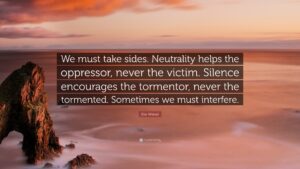Repost, React, Reflect – Social Media and Social Justice

I’ve always encouraged my students to use their voice—to stand up for their thoughts and opinions in ways that are constructive, meaningful, and open to growth. Challenging ideas that don’t align with our own is an important part of learning, but it has to come with a willingness to listen, to reflect, and to try to understand opposing perspectives. We may not always agree, but when we approach each other with openness, there’s potential to learn from one another.
Speaking out about the issues we care about matters. If we stay silent, who will speak up? Our voices have power—not only to take a stand but to educate others about social issues that are often overlooked or misunderstood. Silence strengthens injustice because it allows harmful narratives to go unchallenged. When we speak up, we open the door to conversation, awareness, and hopefully change.

Social media gives us a unique platform to use our voice. Every “like”, “comment”, and “share” boosts the visibility of a message. That kind of amplification can help spread awareness, bring attention to underrepresented causes, and connect people who are fighting for justice. But it works both ways, harmful content can also gain traction when we engage with it, even if our intention is to criticize it. That’s why it’s so important to be intentional and informed about what we post and share.
As educators, we have a responsibility to model what active, responsible citizenship looks like online. That includes teaching our students how to fact-check, how to assess the credibility of sources, and how to engage in difficult conversations in a way that is respectful and constructive. It also means helping them recognize when a conversation isn’t going anywhere and understand that it’s okay to step away because the other person isn’t willing to listen or engage in good faith.
Social media algorithms are designed to reinforce our existing views. Without exposure to differing opinions, it becomes harder to empathize, harder to understand, and easier to become stuck in an echo chamber. That’s why critical thinking and digital literacy are essential skills for today’s students. We need to teach them that not everything online is true, and not every post deserves their attention. Social media activism can be meaningful, but only when it’s paired with the right tools and mindset. Productive conversations about social justice are possible online, but they require patience, humility, and the ability to listen as much as we speak. As teachers, it’s up to us to lead by example and help our students become informed, empathetic digital citizens.
The Influence of Student Activism on Education: A Great Statistical Insight
2 thoughts on “Repost, React, Reflect – Social Media and Social Justice”
Hi Samantha, I definitely connect with your post’s overall message – especially the balance you highlight between speaking up and being able to grow. I’ve seen how empowering students to use their voices can lead to incredible conversations, but only when we’ve scaffolded the skills needed to listen, question, and reflect. Like I said in my learning summary, social media is a double-edged sword. Without digital literacy and critical thinking, it can be dangerous. To combat the negative part of its duality, I love analyzing real posts with students, fact-checking, spotting bias, and discussing the overall impact. What are some of your favourite strategies and/or sites you use to engage students in using their voices and critical thinking skills? I’ve included some of mine below.
https://www.allsides.com/unbiased-balanced-news
https://newslit.org/
https://cor.inquirygroup.org/
Hello,
I always read your post and every time, your thoughts inspires me, so good luck !.